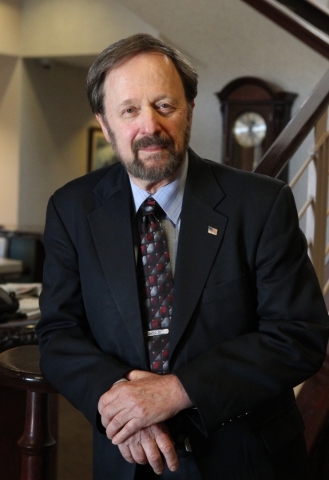US Supreme Court to hear case pitting Las Vegas man against California
CARSON CITY — A Las Vegas man's decades-long fight with California's tax man heads to the U.S. Supreme Court for a second time today, with dozens of states anxiously awaiting the outcome.
Besides the bottom line for Gilbert Hyatt — an inventor and entrepreneur California alleges owes tens of millions of dollars in back taxes and penalties — the court will decide whether states should be immune from being sued in another state's courts without consent.
It's been a long, winding road through the legal system for a case that began in 1991, made two trips to the Nevada Supreme Court, two to the U.S. Supreme Court and saw a judgment of nearly $500 million in Hyatt's favor later substantially reduced, though portions of the case are still pending.
California, in its petition to the U.S. Supreme Court, argued existing law "does not allow a sovereign state to be placed at the mercy of foreign juries" and prohibits a state from exhibiting a "policy of hostility" toward another.
Hyatt's lawyers contend that the tax board was given deference but that immunity does not extend to "deliberate and malicious acts" by other states' government agencies.
"This case is about Nevada's interest in protecting its citizens from injurious intentional torts and bad faith acts committed by sister states' government employees," Mark Hutchison, one of Hyatt's lawyers, said in an email.
Hutchison, who also serves as Nevada's elected part-time lieutenant governor, said the actions by the California tax board "constituted a direct intrusion on Nevada's interests as an independent sovereign, resulting in injuries to Nevada citizens that occurred because California did not confine its unlawful acts to its own territory."
The issues before the nation's highest court will have lasting consequences for states.
Nevada is among 40 states that have signed a friend-of-the-court brief urging justices to overturn a 1979 doctrine that says states are not constitutionally immune from being sued in the courts of another state. Nevada challenged that issue in an earlier case when it appealed a lawsuit filed in a California court by the city of San Francisco, which sought $500,000 for caring for indigent mentally ill patients who were given bus tickets by Nevada to go elsewhere.
The U.S. Supreme Court this summer declined to hear Nevada's appeal in the busing lawsuit, but the Hyatt case before the court today addresses the same issue. Nevada has since settled the lawsuit with San Francisco for $400,000.
According to court documents, Hyatt made millions of dollars in the early 1990s for licensing a computer processing chip he patented. He moved to Las Vegas in 1991. Two years later, the Franchise Tax Board of California initiated an investigation after an auditor reportedly read a newspaper article about his wealth. The investigation included interviews with family members and more than 100 letters sent to financial institutions and professional contacts.
Auditors alleged he moved to Nevada, which doesn't have personal income tax, to avoid paying California taxes. They also concluded he didn't move to Nevada until 1992 and therefore owed California about $10 million for income earned during the disputed time frame. With interest and penalties, the amount has grown substantially.
After the audit investigation, Hyatt sued the California tax board in state court in Nevada, alleging the agency's aggressive tactics included fraud, invasion of privacy and intentional affliction of emotional distress. Hyatt said tax board investigators revealed personal and proprietary information to third parties and contacted two Japanese companies with which he had agreements and that later ceased ties with him because of the investigation.
The Franchise Tax Board sought immunity, arguing it should be given the same protections against civil lawsuits as would a Nevada agency. State law prohibits punitive damages against Nevada government agencies and at that time capped other damages at $50,000.
Nevada's Supreme Court agreed to a point but said immunity did not extend to intentional acts of fraud.
The U.S. Supreme Court, in 2003, essentially agreed with Nevada's stance on the issue, and the case was sent back to state court in Clark County for trial, where a jury awarded Hyatt $85 million for emotional distress; $52 million for invasion of privacy; $1 million for fraud; $250 million in punitive damages. The court then granted $2.5 million in costs and $102 million in interest, bringing the total judgment to $490 million.
In the fall of this year, the Nevada Supreme Court voided all but $1.2 million awarded for fraud and said a new trial should be held to determine damages for emotional distress. But that trial was put on hold after the Franchise Tax Board sought the latest appeal.
Contact Sandra Chereb at schereb@reviewjournal.com or 775-687-3901. Find her on Twitter: @SandraChereb.

















